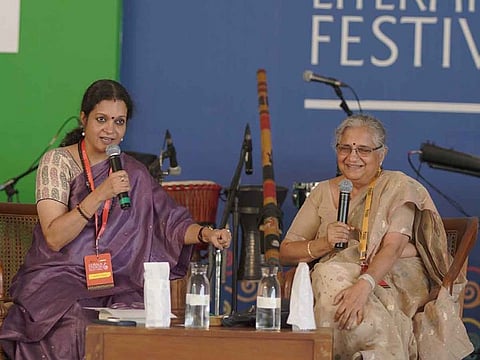Kozhikode leaps to literary stardom
GN Focus looks at out how the city in Kerala is shaping the nation’s literary landscape

Kozhikode, historically known as Calicut, has etched its name in the annals of literary excellence by becoming India’s first Unesco City of Literature. This prestigious recognition underscores the city’s rich literary heritage, vibrant cultural life, and its pivotal role in shaping the literary landscape of Kerala and India.
As Kozhikode joins the ranks of global literary capitals like Edinburgh, Melbourne, and Dublin, it marks a significant milestone for the city’s writers, publishers and literature enthusiasts. There are currently 53 cities of literature, across 34 countries.
Kozhikode has long been a cultural and intellectual hub. Historically, a major trading port, the city has always been a confluence of diverse cultures and ideas. Thanks to a multicultural backdrop, it has fostered a thriving literary scene, where storytelling and intellectual pursuits have flourished for centuries.
Kozhikode’s literary vibrancy is exemplified by festivals such as the Kerala Literature Festival (KLF). Started in 2016, it is organised by the DC Kizhakemuri Foundation, a philanthropic organisation honouring DC Books’ founder, late D.C. Kizhakemuri, a freedom fighter, social activist, writer and publisher.
Held annually, KLF is one of the largest literary festivals in Asia, attracting Nobel laureates, Booker Prize winners, and celebrated authors from around the world. The Mathrubhumi International Festival of Letters (MBIFL) further cements Kozhikode’s reputation as a literary powerhouse, bringing together diverse literary minds.
The city’s literary legacy is deeply rooted in the contributions of its eminent writers. Vaikom Muhammad Basheer, affectionately known as Beypore Sultan, is one of Kozhikode’s most cherished literary figures. M.T. Vasudevan Nair, known for his evocative prose and deep psychological insight, is another luminary from Kozhikode who has significantly shaped the region’s literary identity.
The city’s rich literary tapestry is further enriched by writers such as Uroob, whose poignant narratives highlighted socio-cultural issues, and M. Mukundan, whose works reflect contemporary Malayali society. “While I wrote most of my works living in Delhi, it is Kozhikode that helped me become a writer,” says Mukundan.
Literary heritage
Bestselling author and historian Manu Pillai, whose Sahitya Akademi Yuva Puraskar award-winning book The Ivory Throne chronicles the life and reign of Sethu Lakshmi Bayi of Travancore, is delighted by the news of Kozhikode getting the Unesco City of Literature tag.

“Kozhikode richly deserves the tag. It hosts the annual KLF, a remarkable literature festival that has become one of the most important literature festivals in India,” says Pillai.
“Kerala has a vibrant literary landscape already. A Unesco honour is a vindication and validation of this. If such recognition has been gained, it is because Malayalis have always loved books and engaged with the world of ideas. International notice might give this a further boost.”
Mukundan is all in praise of the city’s honour. “Kozhikode deserves the Unesco recognition more than any other Indian city. It has a rich literary tradition and iconic writers, making it an ideal place for aspiring writers,”says the much acclaimed writer.
“Now, the Kerala government should promote our literary heritage globally, invite international writers, and organize literary events. Establishing an International House of Literature in Kozhikode and collaborating with Unesco and other cultural bodies can further enhance its literary reputation.”
Ravi Deecee, Managing Partner, D C Books, one of India’s leading publishers, emphasises the transformative impact of Kozhikode’s new status. “With the City of Literature tag, Kerala’s book publishing initiatives have been recognised as truly world-class,” he says. “This acknowledges their search for worthwhile content and good literature.”

Deecee sees this recognition as a catalyst for fostering greater collaboration between local and international literary communities. “KLF and the City of Kozhikode are working with other international literary communities, including the City of Literature cities, for partnership and collaboration in terms of author exchange and know-how,” he explains. This collaborative approach aims to create a more interconnected and vibrant global literary community.
D C Books, along with other publishers and the KLF, plans to bolster Kozhikode’s literary community through regular readings, author interactions, and the creation of a proposed Books Street to foster a culture of reading. “We are planning for an Author’s Residency to bring writers from across the globe and night book cafes on the Kozhikode beachfront to promote reading,” Deecee reveals.
Bestselling author, screenwriter, public speaker, and former resident of Kozhikode, Anand Neelakantan shares his affection for the city. “Kozhikode holds a cherished position among Kerala’s literature enthusiasts. I developed a fondness for the city due to its remarkable libraries and the public’s passion for reading and music,” says the author, whose most recent books include The Asura Way and The Tale of a Naughty Prank.
Neelakantan believes that Kozhikode’s literary history, dating back to the Revati Pattathanam gatherings of the Middle Ages, played a crucial role in earning this prestigious title.

Neelakantan also stresses the importance of inclusivity and open dialogue in Kozhikode’s literary scene. “A city will be truly a city of literature only if it can freely and openly discuss diametrically opposing views without fear of censorship,” he asserts.
Pillai agrees. “I hope the Unesco declaration will allow further growth, more diversity, and more powerful and unafraid voices to find a platform in Kozhikode. These are the values literature represents.’’
As the world turns its gaze towards Kozhikode, the city stands ready to embrace its role as a global literary capital, nurturing its rich traditions and fostering a vibrant future for literature.



